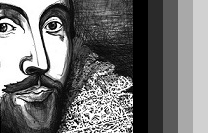Sunday,24,2019
Prof. Angshumitra Basu
Formerly of DEOMEL, Visva-Bharati University, Santiniketan
(Interviewed by Dr. Paromita Chakravarti)
When did you complete your B.A. and M.A.? And details of institutions concerned?
I passed my B.A. in 1949 and M.A. in 1951. I attended Rajshahi College in Bangladesh. Then we came to Kolkata after the partition. Consequently, I lost a year. Then I got into the English Department of Presidency College. That was the year they started allowing entry to female students. There was only one other girl in my class. And there were three men. In all only five students made up the class. We did some classes at Presidency and some at Calcutta University.
When did your first encounter with Shakespeare take place (at school or college)?
At Rajshahi, we did Lamb’s Tales from Shakespeare. We didn’t have Shakespearean plays. I came across Shakespeare proper in college for the first time.
Who taught the texts in question?
Professor Subodh Sengupta used to teach us in Rajshahi College. I was taught by Professor Taraknath Sen at Presidency. I remember him very clearly. He taught us As You Like It. Sukumar-babu taught us too. Tarapada Mukherjee taught us Merchant of Venice. We used to have tutorials. The first day we were asked to write on a Shakespearean sonnet. We sat thinking for a long time. Then we were allowed to postpone the submission by a day. I still remember the comments – ‘mere adjectives are no substitute for criticism’. Subodh Sengupta’s Shakespearian Comedy hadn’t been published as yet. But we were asked to borrow the manuscript and read it! There were Taraknath Sen’s comments in the manuscript. They have incorporated some of those comments in the published book. At Calcutta University, Professor Guha taught us Antony and Cleopatra.
Did the teacher enact the scenes in the class room?
No, the focus was entirely on the text. But Tarak-babu used to discuss stage directions extensively. The style of teaching now has changed vastly. These days there is a lot of focus on criticism. This was not the case before.
Did the teacher discuss philology and prosody while reading Shakespeare?
Our teachers used to focus a lot on prosody and language at that time. The use of blank verse and short lines was something that Tarak-babu taught us at great length. Also, the use of meters was greatly emphasized on. This is not the case anymore.
Were Shakespeare’s contemporary dramatists given the same amount of importance in the classroom?
I myself have taught Marlowe at Visva-Bharati.
Which editions and what critical material were prescribed and used?
Tarak-babu used to tell us which edition to read and he would ask us to read the play before coming to class. Professor Guha used to follow the Percival edition.
Did the teacher refer to stage and film productions of Shakespeare?
It was not customary to refer to stage or film productions much. The focus was always on the text.
Were there any performances of Shakespeare at the institution?
No, there were no performances. When I started teaching in Lady Brabourne College in 1952,
Professor Somnath Moitra used to assign the parts to the girls and ask them to read them out.
However, proper performances didn’t happen.
Any other performances?
The performances I saw were by Utpal Dutt and P. Lal, but they were not Shakespearean plays from what I can remember. I do recall hearing Utpal Dutt enacting Othello in the film, Saptapadi starring Uttam Kumar and Suchitra.
Tell us about your experience of teaching Shakespeare.
I started teaching in Visva-Bharati in 1971. At first I used to teach Marlowe. When I was asked to teach King Lear I wrote to Tarak-babu asking for his guidance. I don’t know whether I will be able to find his letter now but he made a list of the important aspects that I needed to cover.
What noticeable changes in Shakespeare pedagogy and student reaction have you noticed over the decades?
Initially the focus was always on the text, but later the syllabus was gradually altered. However, Jasodhara or Sukanta would be able to speak much better on syllabus change than me.
